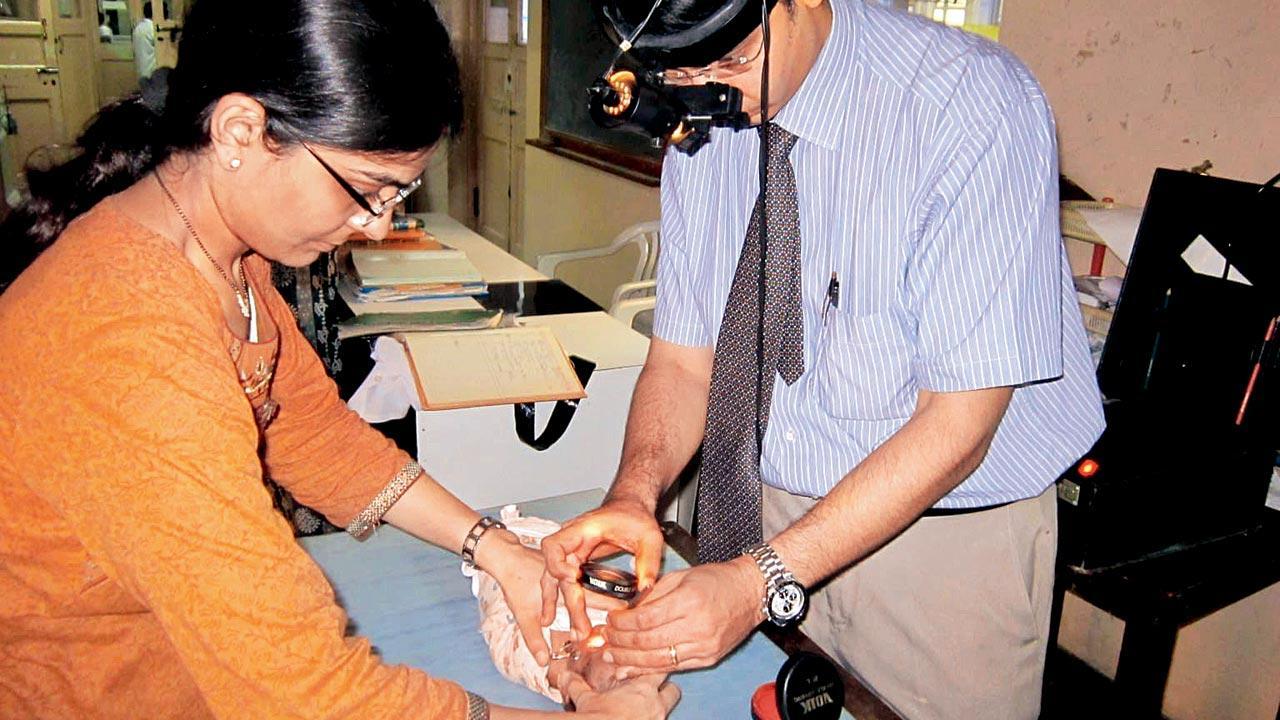Indian Retinopathy of Prematurity Society launches mission to protect vision of fragile infants, urges early diagnosis to prevent lifelong blindness due to ROP; neonatal care initiatives aim to combat rising cases

Dr Anand Subramanyam examining a preemies baby for ROP
Preterm newborns can go blind within 30 days, but you can prevent it,” urges a group of city-based ROP specialists, deeply concerned about the rising number of preterm or low-birth-weight children at risk of lifelong vision loss due to Retinopathy of Prematurity (ROP). As the World Health Organisation commemorates World Prematurity Day on November 17, the Indian Retinopathy of Prematurity (iROP) Society launches a sustained mission to safeguard the vision of premature and underweight newborns.
ADVERTISEMENT
These infants, despite receiving intensive neonatal care, face a heightened risk of vision loss owing to ROP.
The specialists stress the importance of early diagnosis—within thirty days of birth—to effectively treat ROP and avoid irreversible vision impairment in infants. They cite recent cases involving infants of a renowned Bollywood actor and a popular director, emphasising the crucial role of timely ROP diagnosis in preserving their vision.
Dr Karobi Lahiri, a consulting Vitreoretinal surgeon and paediatric ophthalmologist at Bombay Hospital Institute of Medical Sciences and National Ambassador for ROP, explains that preterm babies born under 34 weeks, weighing less than 2000 grams (Indian babies), and undergoing extensive life-saving treatments in neonatal intensive care units (NICU) are particularly susceptible to ROP. Early detection and aggressive treatment significantly reduce the risk of lifelong blindness in such preemies.
“Approximately 50,000 preterm infants are getting blind from ROP worldwide. This is due to better survival of pre-terms from improved NICU facilities and greater numbers of birth of smaller babies due to multiple births through IVF conceptions, which cannot be ruled out,” said Dr Lahiri, highlighting the urgency to address this growing problem through precautionary measures and strict follow-ups.
“A small percentage of such premature infants, apart from ROP also show other comorbidities in the form of neurodevelopmental defects, which may also hamper their quality of life, and they may need to be rehabilitated to ensure a better life,” she said.
Numbers speak
“Roughly 15 million babies are born prematurely worldwide each year, and India tops the list for the highest number of preterm births. A staggering estimate of 3,519,100 preterm births was recorded in India in 2010. Of these, if about 30 percent have access to neonatal care, approximately one lakh babies survive annually, yet remain at risk of developing ROP and thus require screening,” said Dr Lahiri.
Dr Lahiri emphasises the crucial need for ROP screening in all preterm neonates, outlining specific criteria for screening eligibility:
. Babies born < 34 weeks gestation and/or < 1750 grams birth weight.
. Infants at 34-36/7 weeks gestational age.
. Those with a birth weight between 1750-2000 grams.
. Infants born < 28 weeks or < 1200 grams birth weight require early screening within 2-3 weeks of age to enable early identification of AP-ROP.
The initial retinal examination should be conducted no later than 3 weeks of age.”
Why should we worry
Dr Lahiri presents alarming statistics, revealing that out of 26 million live births in India, around 2 million are at risk of developing ROP, with an incidence rate between 38 percent and 51.9 percent among low-birth-weight infants. Lack of awareness among ophthalmologists and neonatologists is contributing to a substantial increase in ROP-related blindness, imposing a significant socio-economic burden.
Children not born with ROP
“ROP is not a blinding disease if detected early and aggressively on time. The child is not born with ROP, it develops within the first few weeks of life (3 to 6 weeks) and it is a totally preventable disease. A child need not go blind from ROP, ensure early examination for your preterm baby at 3 weeks either in the NICU or from home, and prevent a major catastrophe,” said Dr Lahiri.
Way out
“To tackle this disparity, India’s policymakers have demonstrated a strong commitment to newborn health, resulting in a nationwide network of facility-based newborn care units,” Dr Lahiri said, emphasising the need for heightened awareness.
Need awareness
Dr Anand Subramanyam, head of retina services and ROP specialist at KBH Bachooali Charitable Eye and ENT hospital, stresses the preventability of ROP and the urgent need for awareness among healthcare providers and parents. “We have come across cases, wherein Bollywood actors and directors, whose preterm infants were in neonatal care for weeks to months, and they were fortunate to have been timely diagnosed of ROP and their vision could be saved,” said Dr Anand.
Tie-up with BMC
With an aim to detect ROP in preemies within the golden hour window of thirty days, in collaboration with civic-run hospitals, including KEM, Sion, Cooper, and Wadia Children hospital, KBH Bachooali Charitable Eye and ENT hospital has initiated early screening for ROP among admitted preemies, detecting two to three early cases on average among screened NICU infants.
Retinopathy of Prematurity progresses through five stages, necessitating careful monitoring and prompt treatment to avert severe vision impairment or blindness in infants. Dr Lahiri and Dr Anand advocate for early intervention within the crucial 30-day window to ensure effective treatment and prevent long-term visual
complications.
Nov 17
World Prematurity Day
 Subscribe today by clicking the link and stay updated with the latest news!" Click here!
Subscribe today by clicking the link and stay updated with the latest news!" Click here!







